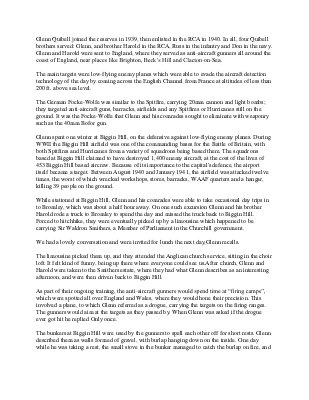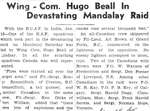Quibell, G.
- Media Type
- Text
- Genealogical Resource
- Item Type
- Documents
- Description
Glenn Quibell joined the reserves in 1939, then enlisted in the RCA in 1940. In all, four Quibell brothers served: Glenn, and brother Harold in the RCA, Russ in the infantry and Don in the navy. Glenn and Harold were sent to England, where they served as anti-aircraft gunners all around the coast of England, near places like Brighton, Beck’s Hill and Clacton-on-Sea.
The main targets were low-flying enemy planes which were able to evade the aircraft detection technology of the day by coming across the English Channel from France at altitudes of less than 200 ft. above sea level.
The German Focke-Wolfe was similar to the Spitfire, carrying 20mm cannon and light bombs; they targeted anti-aircraft guns, barracks, airfields and any Spitfires or Hurricanes still on the ground. It was the Focke-Wolfe that Glenn and his comrades sought to eliminate with weaponry such as the 40mm Bofor gun.
Glenn spent one winter at Biggin Hill, on the defensive against low-flying enemy planes. During WWII the Biggin Hill airfield was one of the commanding bases for the Battle of Britain, with both Spitfires and Hurricanes from a variety of squadrons being based there. The squadrons based at Biggin Hill claimed to have destroyed 1,400 enemy aircraft, at the cost of the lives of 453 Biggin Hill based aircrew. Because of its importance to the capital's defence, the airport itself became a target. Between August 1940 and January 1941, the airfield was attacked twelve times, the worst of which wrecked workshops, stores, barracks, WAAF quarters and a hangar, killing 39 people on the ground.
While stationed at Biggin Hill, Glenn and his comrades were able to take occasional day trips in to Bromley, which was about a half hour away. On one such excursion Glenn and his brother Harold rode a truck to Bromley to spend the day and missed the truck back to Biggin Hill. Forced to hitchhike, they were eventually picked up by a limousine which happened to be carrying Sir Waldron Smithers, a Member of Parliament in the Churchill government.
We had a lovely conversation and were invited for lunch the next day,
Glenn recalls.The limousine picked them up, and they attended the Anglican church service, sitting in the choir loft.
It felt kind of funny, being up there where everyone could see us.
After church, Glenn and Harold were taken to the Smithers estate, where they had what Glenn describes asan interesting afternoon
, and were then driven back to Biggin Hill.As part of their ongoing training, the anti-aircraft gunners would spend time at “firing camps”, which were spotted all over England and Wales, where they would hone their precision. This involved a plane, to which Glenn referred as a drogue, carrying the targets on the firing ranges. The gunners would aim at the targets as they passed by. When Glenn was asked if the drogue ever got hit he replied
Only once
.The bunkers at Biggin Hill were used by the gunners to spell each other off for short rests. Glenn described them as walls formed of gravel, with burlap hanging down on the inside. One day while he was taking a rest, the small stove in the bunker managed to catch the burlap on fire, and Glenn ended up in a burn ward for three weeks, suffering 3rd degree burns to his legs, in the company of many burned and injured pilots.
Glenn was part of the second wave at Dieppe in 1942. Standing aboard a landing craft carrying three Churchill tanks, they could do nothing but try to dodge bombs and artillery fire while the first wave was slaughtered. Five hours later the second wave was called off, and the forces retreated.
The year 1942 was memorable for Glenn in another, more pleasant way. Canadian and British soldiers received a two-day leave and tickets for a concert at Royal Albert Hall. There was rumour of a surprise, and sure enough, at intermission the spotlight shone on the royal box and the Queen Mother stood up and waved to everyone, to the particular delight of the men in uniform who were there that day.
Another arena of battle for Glenn was at Caen. The Battle for Caen from June to August 1944 was a battle between Allied (primarily British and Canadian troops) and German forces during the Battle of Normandy.
Originally the Allies aimed to take the French city of Caen, one of the largest cities in Normandy on D-Day. Caen was a vital objective for several reasons. First, it lay astride the Orne River and Caen Canal; these two water obstacles could strengthen a German defensive position if not crossed. Second, Caen was a road hub; in German hands it would enable the enemy to shift forces rapidly. Third, the area around Caen was relatively open and was valued for airfield construction.
On D-Day, Caen was an objective for the British 3rd Infantry Division and remained the focal point for a series of battles throughout June, July and into August.
After Caen, Glenn returned to England for training in 5.5” artillery, which used 100 lb. shells and had a range of up to eight miles.
He didn’t catch up with his unit again until Niemegan in Holland.
We held the line that cold winter, mostly underground, until we could create an offensive right into Germany for the big finale,
Glenn explained.The war ended in 1945, but Glenn didn’t return home until 1946. Single men were the last to be discharged, as it was felt that married men with families had a greater urgency to get back home.
Glenn elaborates little on the more unpleasant details of his service, saying that he suffered little in comparison to others who were over there. He does talk about the remarkable spirit of the citizens of England. The east end of London was reduced to ruins by the Blitzkrieg but, as he says,
the English people stood up.”
During last year’s Poppy campaign, I took a chair from the Branch before I headed out to my first shift. Knowing Glenn was my replacement, I thought I was being helpful when I asked, upon his arrival, if he would like a chair. He looked me straight in the eye and replied
No. Would you?
Needless to say, I left the chair in the van.
Glenn celebrated his 94th birthday a few weeks ago [October 2012], and was once again one of the first to sign up for Poppy canvassing.
Where were you?
- Date of Publication
- Oct 2012
- Subject(s)
- Personal Name(s)
- Glenn Quibell
- Language of Item
- English
- Copyright Statement
- Copyright status unknown. Responsibility for determining the copyright status and any use rests exclusively with the user.
- Contact
- Kawartha Lakes Public LibraryEmail:lindsaylibrary@kawarthalakeslibrary.ca
Website:
Agency street/mail address:190 Kent St W.
Lindsay, ON K9V 2Y6
(705) 324-9411 extension 1268



